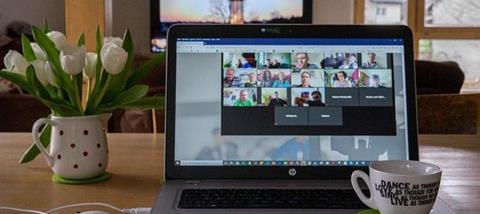
When the Covid-19 pandemic hit, church buildings were closed and we all had to learn very quickly how to worship, interact and connect online. This came more easily to some than to others, but I don’t think anyone made that shift without any struggle.
As churches we’ve had to tackle a lot of different challenges, from learning the basics of live-streaming to reapplying our theology of what church even is when we can’t gather physically. We’ve learned what a stream key is and that church was never about the building in the first place.
That’s been perhaps one of the biggest lessons that we have learned during this pandemic. Pre-Covid, we would say things like: “The Church isn’t the building, it’s the people” and “Church isn’t a place you go to, it’s a family you belong to. ”We believed these statements to be true, but if we’re honest with ourselves our activities and efforts still often reflected a different priority entirely – that what happens in the building is what matters. How often did we ask: “Are you going to be at church this week?” or “Which church do you go to?”
Accelerated change
The pandemic has forced us to shift our practices and our thinking to be more in line with what we have always said about church – that it is not the building, it is the people. This shift has been needed for a long time, and it’s been coming gradually. It’s been said that this pandemic has accelerated some change that would have inevitably happened in a few years’ time anyway.
No leader with any wisdom would have suggested closing our church buildings and moving all our services online with immediate effect, even knowing the opportunities that change would bring. Yet here we are, nearly a year since the first lockdown, and many of our churches (including the one I serve) have yet to meet in our buildings again.
The closing of our buildings has moved the Church onto online platforms and into fresh and creative ways of building community and making disciples. Most of us have spent a great deal of our time on Zoom. For life groups, leadership meetings, prayer meetings, live-streamed services, coffee and chat and one-to-one meetings, Zoom has been the place to be.
While Zoom (and Teams if you’re a Teams person) is a helpful tool that has enabled us to facilitate ministry during this pandemic, I’ve begun to wonder if the shift that we began with in March 2020 hasn’t quite gone as far as it needs to.
Have we simply created a new building?
It’s been said that the metrics churches have used to measure success are ABC – Attendance, Buildings and Cash. I don’t know who coined this, but I read it most recently in Neil Hudson’s book Imagine Church (IVP). With these metrics, a successful church has high attendance, a nice building that is fit for purpose and a healthy bank balance that will facilitate ministry.
Church leaders far more seasoned than me have wrestled with the question of a better metric for success. How do we measure our effectiveness in making disciples of Jesus? That’s a whole separate post – probably a whole book – for another time! As I’ve observed what’s going on across the Church in the UK, and as I’ve sought to bring leadership to the church I serve, I keep coming back to the question: have we simply created a new building?
Perhaps it’s because what’s most visible for us is the number of people who are watching our services live on YouTube or how many devices have connected in to our Zoom meeting, but it seems to me that our focus has in some ways shifted from how many bums we have on seats in the building to how many devices we have in the Zoom room.
What’s been on my heart over the last few months is a desire as a leader to be more releasing, more empowering, more equipping and more encouraging. I want to see ‘ministry’ placed into the hands of every follower of Jesus and taken into wherever their weekly routine takes them. This is what I see modelled by Jesus himself and by the early Church.
I want to see ‘ministry’ placed into the hands of every follower of Jesus and taken into wherever their weekly routine takes them.
I want to see fewer centrally run activities and more dreamers enacting what God has laid on their heart to do where he has placed them. I want to see discipleship growth taking place in twos and threes as well as in small groups and in large gatherings. I want to see families inviting in the lonely. I want to see a shift from ‘can the church’ (meaning the church leadership) to ‘can we’ (meaning ordinary Christians who share a God-given dream).
These shifts are already taking place, but in order for them to happen in earnest we need to shift our expectations and our priorities some more. This is a wrestle, because I do want to see more people engaging with our online services; I do want to see more people at our weekly Zoom prayer meeting; I do want to see more people involved in life groups. What’s changing in me is that I’m beginning to want those things less than I want the things I’ve listed above.
It’s so easy for us to default to a newer version of the old thinking. It’s easy for Zoom to replace the church building in our thinking and in our measurement of success. I firmly believe that God has more for us during this pandemic…and after it. I’m writing this as a church leader who doesn’t have all the answers; a follower of Jesus who is still working all this out myself; a father and husband who often is just trying to keep plodding on through all this.
The burden on my heart since the lockdown began hasn’t shifted, and it’s this: I don’t want to miss out on the new thing that God is doing because it’s simpler or more comfortable to go back to what we did before. I don’t yet know what God is doing, and I’m taking great comfort from the fact that it doesn’t look like anyone does. Let’s continue to listen to God, embrace the discomfort of this time and press forward one step at a time. Going backwards is an option, but it’s not one I want to take.
Jack Skett is lead pastor at Dewsbury Elim Church in West Yorkshire, alongside his wife Annie, and is passionate about seeing people encounter Jesus in the ordinary stuff of their lives
Premier Christianity is committed to publishing a variety of opinion pieces from across the UK Church. The views expressed on our blog do not necessarily represent those of the publisher.




























